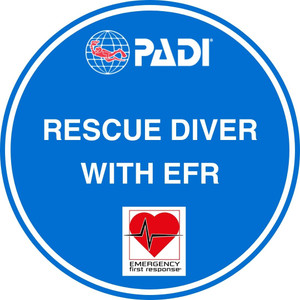
Combine this programme with Emergency First Response (EFR), Care for Children (CFC) and PADI Emergency Oxygen Provider Specialty, and it will give you the confidence to respond to a range of medical emergencies, both in the everyday world and also in the specialised area of scuba diving.
Minimum age: 12 years
Course prerequisites: PADI (Junior) Advanced Open Water Diver (or equivalent certification)
What will I do?
Until now the emphasis of your rescue training has been on basic accident prevention and safe diving. The PADI Rescue Diver Gold package takes you to the next level, expanding your knowledge to include accident management and many various rescue techniques.
We have five full days of intense first aid and rescue training to complete. In our fully equipped multi-media classrooms you will learn how to deal with many different scenarios, from a simple jellyfish sting to assisting with the emergency services in a full blown missing diver scenario.
First, you will complete a full EFR course, which trains you in first aid and CPR and meets an important requirement for the Rescue Diver programme. The EFR certification is a recognised Certificate of First Aid and comprises of two modules. The Primary Care section teaches you the steps and techniques for handling life-threatening emergencies. You’ll learn skills for aiding patients who aren’t breathing, have no heartbeat, may have a spinal injury, may be in shock or who may have serious bleeding. You’ll learn to how to perform CPR and continue to monitor the patient, so that you provide every possible chance of survival while waiting for emergency medical services to arrive. The Secondary Care section will focus on what to do while waiting for the Emergency Medical Services to arrive, and teaches you how to provide first aid that eases pain and reduces the risk of further harm. You’ll learn to assess a variety of injuries and illnesses and practise bandaging and splinting.
You will put what you learn into practice in a combination of skills in the pool and open water, culminating in a day of scenarios at one of our local open water dive sites. Never before will you have been so challenged in your diving skills and in what you have learnt.
On the Care for Children course you will learn emergency care skills specific to helping infants and children with medical emergencies. The training is designed for those who work with children, have a young family, or are likely to have to respond to emergencies involving youngsters.
Finally, on the PADI Emergency Oxygen Provider course you’ll learn about dive injuries, different types of emergency oxygen equipment and safety considerations when using oxygen. You will develop your skills so that you are confident in assembling and disassembling emergency oxygen equipment, deploying a non-rebreather mask and a demand inhalator valve on a breathing diver and using a pocket mask on a nonbreathing diver.
How do I get started?
Just pick your dates if you can and pay your £299 deposit and you will receive your PADI Rescue Diver eLearning login details. Don’t worry if you can’t commit to a date straight away. There are plenty scheduled throughout the year and you can get started on the home study as soon as you have received your eLearning code.
How long will it take?
The Rescue Diver and EFR programmes take place over two weekends. On the first Saturday you will complete the EFR course, including both the primary care and secondary care segments. On the Sunday you will complete the theory sections from the PADI Rescue Diver programme and practise your skills in our heated onsite training pool.
The following weekend will cover all the practical sessions and scenarios at one of our local open water sites.
The Care for Children and Emergency Oxygen Provider courses will take place on a further weekend day in one of our multi-media classrooms.
What will I need?
The PADI Advanced Open Water certification or equivalent is the prerequisite for the Rescue Diver programme.
All the PADI materials and scuba equipment needed to complete the programme are included in the cost, although for hygiene reasons you will need to have your own pocket mask. These can be purchased from our shop at the start of your course.
You will also need to fill out a self-certification medical statement. If you have any medical conditions that you think may prevent you from scuba diving, please feel free to contact us and we will try to be of assistance.
In addition, you will need to pay for your entry to the open water dive site and any required air fills while away from the centre. This is approximately £20 for each day.
Where can I go from here?
Once you have completed your PADI Rescue Diver programme you have reached a crossroads in your diving. As a prerequisite to the PADI Divemaster programme and then onto the Instructor levels, many see the PADI Rescue Diver as the first step on the road to becoming a PADI Professional.
Others choose the path of the PADI Master Scuba Diver. This is the highest non-professional rating in the PADI system of diver education. By completing the Rescue Diver and EFR with a further five PADI specialties taken from the many available and logging 50 dives, you can receive recognition as a Master Scuba Diver by certifying through your Instructor at Aquasport.




